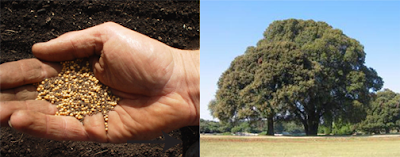
Recently I watched a video about the first computer ever made. It was roughly the size of an operation table and could do less than half of what your calculator on your phone can do. It was a big deal, though, because even though it couldn't do much it meant that what it could do, you no longer had to do yourself.
This was one of several events that has sparked my interest in the power that comes in creating things that do things for you. I have mentioned before that I think everyone should learn a programming language. I think it should required in schools like English, or like foreign languages. This is why:
Imagine a being able to speak and have the elements combine in front of you. Imagine saying to the elements "Combine and create a world." And the elements combine and create a world. That would be an amazing power.
Now consider for a minute that the very computer you are reading this blog with is capable of handling the computations that the worlds largest and most powerful machinery run on. These machines can bend and shape and carve material to create cars, airplanes, houses, even computers themselves. If you know the language of computers, you can speak and say "Combine these elements and make a car." And the elements combine and create a car. That is also an amazing power.
Speaking of power, I remember reading some of the Harry Potter books, as well as watching some of the movies. I remember thinking to myself that out of all of the characters Hermione best represented my attitude. If I had magical abilities you can rest assured that I would spend every waking moment, (and most likely every non-waking moment) research and developing those powers.
Let me give an example:
Ron might look at the ability to levitate a feather and think "Hmm, this is boring, why would I want to lift feather's anyway? This isn't very useful." Then he would go and perhaps eat some weird enchanted candies.
I would look at that same ability to levitate a feather and the first thing I would think is "Does anybody else see what I'm seeing? Is anyone else realizing the potential this has?" Looking around I would see the Ron's and the Harry Potters who all just care about passing a class so that they can return to their enchanted candies or to dealing with the Voldemorts in their lives. Meanwhile, I would do the following:
First I would expand my portfolio of objects that I could levitate. First feathers, then everything else. If I can levitate things, why not myself. Soon I have gained the ability to fly because I levitate my bones, ligaments, and muscles, and everything else follows.
If I had an invisibility cloak I wouldn't leave it in a box in my room, I would cut it up and make long underwear out of it, with fold back footies, gloves, and a hoodie. Walking around people would see me in my robes and think everything is fine. On a whim if I wanted to disappear I simply take off my robes and I'm gone. If I really wanted to leave no footprint I would add a napsack that I could store my robes in.
So now I can fly and be invisible. Imagine how the books would have turned out if Harry Potter was flying around invisible since book two, or whenever it was that he got the cloak.
When power to improve one's environment is so blatantly obvious it doesn't take much to find the drive to master the steps necessary to gain that power. It is when the steps to that power are obscured or appear unobtainable that their is no drive.
In this way a lot of people:
Don't see the benefit in learning the language of computers.
Don't think that benefit is obtainable given their situation.
I have to admit that, for myself, the power to create more than mere websites has also seemed obscure and unobtainable. It hasn't been until recently that the true power that already lies underneath my fingertips has been discovered.
I believe this is related to the gospel as well. Many have an obscured view of what blessings are in store for them if they would only take the necessary steps. There are also those who might understand the blessings but do not think they are capable of obtaining them.
We can be comforted with the good news that the blessings are real, and the blessings are obtainable. Obtain the vision, obtain the steps, perform the steps, then obtain the blessings.
I invite you to live the gospel and obtain those blessings that are very real, and very obtainable.













